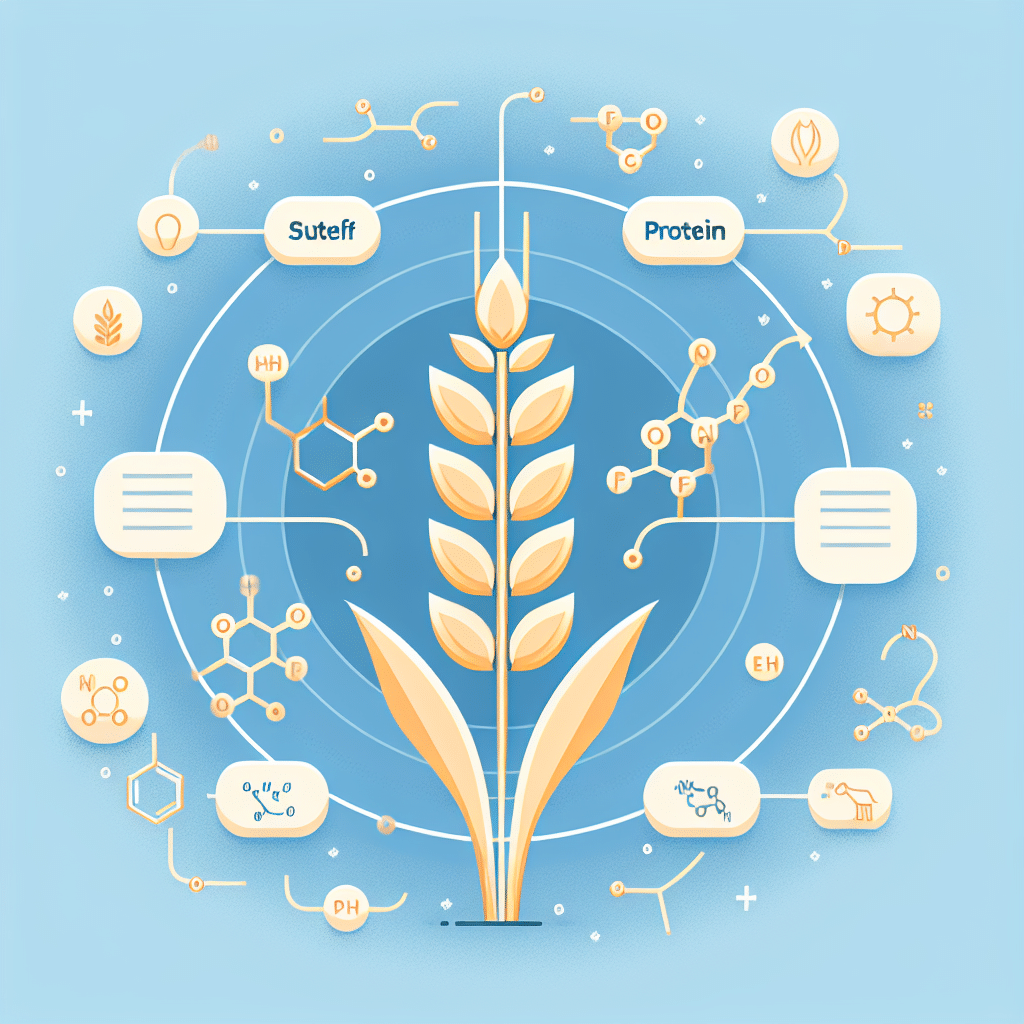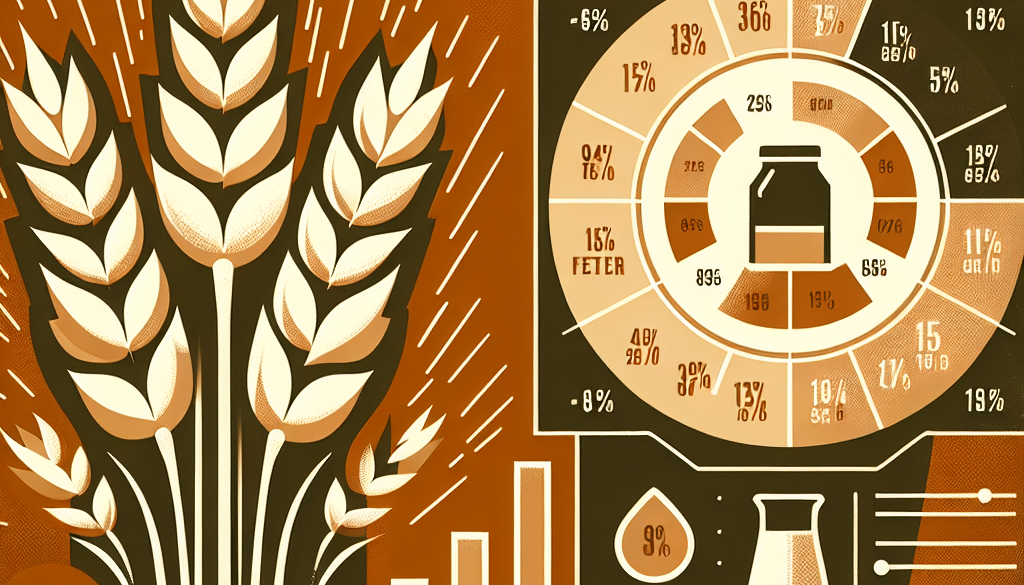Is Wheat A Good Source Of Protein?
-
Table of Contents
- Wheat Protein: An Underrated Source of Nutritional Power?
- Understanding Wheat’s Nutritional Composition
- Protein Quality in Wheat
- Wheat Protein in a Plant-Based Diet
- Case Studies and Research on Wheat Protein
- Wheat Protein and Muscle Building
- How Much Protein Does Wheat Provide?
- Wheat Protein for Weight Management
- Conclusion: Weighing the Benefits of Wheat Protein
- Explore ETprotein’s High-Quality Protein Offerings
Wheat Protein: An Underrated Source of Nutritional Power?

When it comes to protein sources, the usual suspects like meat, dairy, and legumes often dominate the conversation. However, wheat, a staple food for a large portion of the world’s population, is not typically recognized for its protein content. This article delves into the nutritional profile of wheat, examining its potential as a good source of protein and its role in a balanced diet.
Understanding Wheat’s Nutritional Composition
Wheat is primarily known for its carbohydrate content, particularly in the form of starches and fibers. However, it also contains a significant amount of protein. The protein content in wheat can vary depending on the type, with whole wheat generally offering more protein than refined versions due to the presence of the germ and bran in whole grains.
Protein Quality in Wheat
The quality of protein is measured by its amino acid composition and digestibility. Proteins are made up of amino acids, some of which are essential because the body cannot produce them. Wheat protein, known as gluten, is comprised of gliadin and glutenin, which are rich in the amino acids glutamine and proline but low in lysine.
While wheat may not be a complete protein on its own, it can be complemented with other protein sources to ensure a balanced intake of essential amino acids. For example, combining wheat with legumes, such as in the traditional dish of beans and bread, can provide a more complete protein profile.
Wheat Protein in a Plant-Based Diet
For vegetarians and vegans, wheat protein can play a crucial role in meeting daily protein requirements. Seitan, a meat substitute made from wheat gluten, is a popular choice for its versatility and high protein content. It’s a testament to wheat’s potential as a primary protein source in plant-based diets.
Case Studies and Research on Wheat Protein
Several studies have highlighted the benefits of including wheat in a balanced diet. For instance, research has shown that whole wheat products can contribute to a lower risk of chronic diseases such as type 2 diabetes and cardiovascular disease, thanks to their fiber and nutrient content, including protein.
Wheat Protein and Muscle Building
When it comes to building muscle, protein is an essential nutrient. While whey and casein (both dairy proteins) are often the go-to sources for many athletes, wheat protein has also been shown to support muscle synthesis. Although it may not be as effective as some animal-based proteins due to its lower lysine content, it can still contribute to muscle building, especially when combined with other protein sources.
How Much Protein Does Wheat Provide?
The protein content in wheat varies, but on average, whole wheat flour contains about 13 grams of protein per 100 grams, while refined wheat flour has slightly less. To put this into perspective, the recommended daily allowance (RDA) for protein is 46 grams for women and 56 grams for men, so wheat can contribute a significant portion of this requirement.
Wheat Protein for Weight Management
Protein is known for its satiating effect, which can aid in weight management. Foods high in protein, like wheat, can help keep you feeling full longer, potentially reducing overall calorie intake. This makes wheat-based foods a valuable component of a diet aimed at maintaining or losing weight.
Conclusion: Weighing the Benefits of Wheat Protein
In conclusion, wheat can indeed be considered a good source of protein, particularly for those following a plant-based diet. Its protein content, while not complete in amino acid profile, can be complemented with other foods to create a balanced and nutritious diet. Moreover, wheat’s additional health benefits, such as its fiber content and association with reduced chronic disease risk, make it a valuable food item for various health goals, including muscle building and weight management.
For those looking to incorporate high-quality protein into their diets, ETprotein company’s range of protein products offers an excellent alternative. Their organic and non-GMO protein powders, including rice, pea, and seed-based proteins, provide a diverse array of options for those seeking to boost their protein intake with plant-based sources.
Explore ETprotein’s High-Quality Protein Offerings
ETprotein is dedicated to supplying top-tier protein products that cater to a wide range of dietary needs and preferences. Whether you’re formulating sports nutrition supplements, developing health and wellness products, or crafting infant formulas, ETprotein’s extensive selection ensures that you have access to the best protein sources available.
About ETprotein:
ETprotein, a reputable protein and L-(+)-Ergothioneine (EGT) Chinese factory manufacturer and supplier, is renowned for producing, stocking, exporting, and delivering the highest quality organic bulk vegan proteins and L-(+)-Ergothioneine. They include Organic rice protein, clear rice protein, pea protein, clear pea protein, watermelon seed protein, pumpkin seed protein, sunflower seed protein, mung bean protein, peanut protein, and L-(+)-Ergothioneine EGT Pharmaceutical grade, L-(+)-Ergothioneine EGT food grade, L-(+)-Ergothioneine EGT cosmetic grade, L-(+)-Ergothioneine EGT reference grade and L-(+)-Ergothioneine EGT standard. Their offerings, characterized by a neutral taste, non-GMO, allergen-free attributes, with L-(+)-Ergothioneine purity over 98%, 99%, cater to a diverse range of industries. They serve nutraceutical, pharmaceutical, cosmeceutical, veterinary, as well as food and beverage finished product distributors, traders, and manufacturers across Europe, USA, Canada, Australia, Thailand, Japan, Korea, Brazil, and Chile, among others.
ETprotein specialization includes exporting and delivering tailor-made protein powder and finished nutritional supplements. Their extensive product range covers sectors like Food and Beverage, Sports Nutrition, Weight Management, Dietary Supplements, Health and Wellness Products, and Infant Formula, ensuring comprehensive solutions to meet all your protein needs.
As a trusted company by leading global food and beverage brands and Fortune 500 companies, ETprotein reinforces China’s reputation in the global arena. For more information or to sample their products, please contact them and email sales(at)ETprotein.com today.














